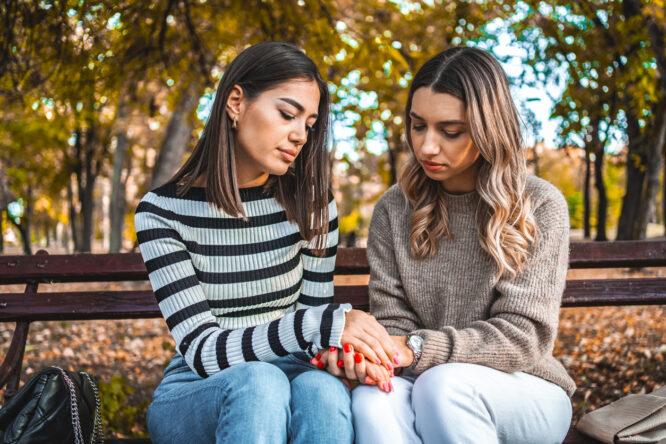Being a good friend isn’t about grand gestures or declarations.

In reality, it’s about how you show up consistently in the small, meaningful ways for the people you care about. If you’re the real deal, these 15 things should come naturally—or, at the very least, be things you’re willing to do when it matters. Obviously, there will be times when these things aren’t possible, or you simply don’t feel like doing them, and that’s okay. However, more often than not, they should be pretty easy tasks to fulfil.
1. Let them vent without fixing it.

Sometimes people just need to unload. No advice, no solutions—just someone who’s actually there and paying attention. If your first instinct is to jump in with answers, take a step back. Being a good friend means knowing when to listen without taking over.
Letting someone talk without trying to manage their emotions shows trust. It says you believe they’re capable of figuring things out. You’re just there to hold space while they work through it.
2. Be the one who reaches out first sometimes.

Friendships don’t last if one person is always doing the work. If you care about someone, don’t sit around waiting to be invited. Send the message. Make the call. Show up without needing a reason. It doesn’t have to be dramatic—just a quick “How’s your week been?” can keep the connection alive. If you value the friendship, act like it. Consistency matters more than big moments.
3. Let them cancel without making it weird.

Life happens. Energy changes. If your friend needs to back out of plans, a good friend doesn’t guilt-trip them or make it about themselves. You give them space and let them know it’s okay. Being chill about stuff like this builds trust. It shows you’re not keeping score and that your friendship isn’t based on flawless attendance—it’s based on real understanding.
4. Sit with them when they’re not okay, even if it’s uncomfortable.

Not everyone knows how to be around sadness, but if you’re a real friend, you show up even when there’s nothing you can do to fix it. You just sit in the heaviness and let them know they’re not in it alone. You don’t need the perfect words. You just need to stay present. A lot of people disappear when things get messy. A real friend doesn’t.
5. Celebrate their wins without turning it into a comparison.

When something goes right for them, hype them up. Full stop. Don’t immediately bring up how you’re struggling. Don’t try to one-up it. Just be happy for them. That kind of joy is rare, and it sticks. If you can only support your friends when you’re doing better than them, it’s not friendship. Real ones cheer loud, even when their own stuff’s on hold.
6. Accept that sometimes, they’ll change.

Friends grow. Interests change. People evolve. If you’re only down for the version of them that fits into your world perfectly, you’re not really accepting them—you’re just tolerating them on your terms. Good friendship makes room for growth. It doesn’t shame people for outgrowing old versions of themselves. You can miss who they were and still support who they’re becoming.
7. Let them have boundaries without taking it personally.

If they ask for space, say no to plans, or take longer to respond, don’t spiral. Respect the boundary. Don’t make it about your ego. A good friend understands that people have limits, and doesn’t push past them. Friendship doesn’t mean access 24/7. Sometimes love looks like giving someone breathing room and trusting the connection enough to know it’ll still be there.
8. Call them out when it actually matters.

Being a good friend doesn’t mean being passive. If they’re acting out of line or hurting someone—including themselves—you speak up. It’s not to shame them, but to help them see what they can’t right now. It’s not about policing. It’s about care. Calling someone out with respect means you’re invested in who they are, not just how comfortable the friendship feels.
9. Apologise when you get it wrong.

We all mess up. What matters is whether you own it. A solid friend says, “That was on me,” without dodging or getting defensive. They fix it instead of acting like nothing happened. Real connection comes from accountability. If you never apologise, people stop feeling safe around you. Being a good friend means being willing to repair, not just move on.
10. Hold space for their excitement, even if it’s not your thing.

You don’t have to love what they love, but you should respect it. If they’re excited about something, let them talk about it. Ask questions. Let them have their moment without downplaying it or changing the subject. Being interested in what lights them up, even just for a few minutes, isn’t about the thing. It’s about showing them they matter to you. That kind of attention builds connection fast.
11. Let the friendship be imperfect sometimes.

Not every friendship will be perfectly balanced or perfectly timed. People get busy. Life gets chaotic, but when the foundation is real, you don’t panic when things feel a bit off for a while. Good friends don’t need constant maintenance. They trust the connection enough to ride out the quiet patches and come back when it makes sense. That kind of steadiness is everything.
12. Show up for them when they don’t ask.

Sometimes people won’t come out and say, “I need help,” but you can tell something’s off—and a good friend doesn’t wait for permission to check in. You send the text. You drop the meal off. You sit quietly with them anyway. You don’t need a crisis to show up. You just need to notice and care. That’s what separates casual friendships from the ones that actually last.
13. Don’t punish them for being happy when you’re not.

It’s hard to celebrate someone else’s good news when you’re going through it. But a good friend doesn’t dim someone else’s light just because they’re in a dark patch. They know how to hold both at the same time. Being happy for someone else, even when you’re hurting, is a quiet act of love. It shows maturity, care, and the kind of emotional range that friendships really need.
14. Make space for silence without weirdness.

You don’t always need deep talks or nonstop laughs. Some of the best friendships are the ones where you can sit in silence and still feel connected. No pressure. No forced vibes. Just ease. When someone can be quiet around you without feeling awkward, it means they feel safe. Honestly, that’s one of the most underrated parts of being a good friend.
15. Keep showing up when it’s not convenient.

When things are fun and easy, everyone’s available. But when life gets messy, tiring, or complicated, that’s when real friendship shows itself. A good friend doesn’t disappear when it’s inconvenient; they adapt and find ways to still be present. That doesn’t mean overextending yourself—it means caring enough to stay close even when things aren’t ideal. If the friendship matters, you’ll make it work. And they’ll do the same for you.




